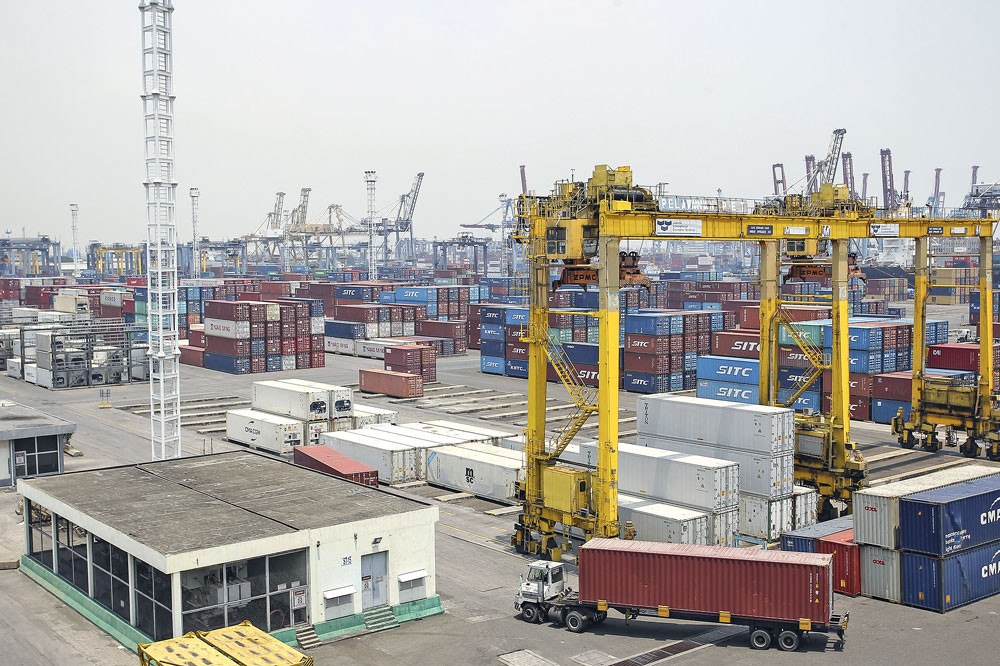The country’s tourist sector has taken a hit amid the novel coronavirus outbreak in China that has spread to other countries, as more trip and hotel booking cancellations have been reported following travel bans on tourists to and from China.
The Indonesian economy is projected to slow further this year, with the coronavirus epidemic expected to add to global uncertainties and in turn worsen the country’s economic outlook, analysts say.
The analysts estimate that growth would fall below the government’s 5.3 percent target as a result of the outbreak significantly reducing Indonesia’s exports to China, one of the country’s main trading partners.
Center of Reform on Economics (CORE) director Mohammad Faisal estimated that the economy would decline to 4.9 percent this year from 5.02 percent last year. This was primarily because the coronavirus outbreak that emerged in late December 2019 in Wuhan, China, would increase pressures on a global economy that had been burdened by the prolonged US-China trade war and growing US-Iran tensions.
“In 2019, we experienced a number of unprecedented events like the US-China trade war and US-Iran conflict, but the coronavirus outbreak has left the biggest impact,” Faisal said on Tuesday at a seminar on the outlook of Indonesia’s exports in n Jakarta.
Faisal said that even though the mortality rate of the novel coronavirus (2019-nCoV) was estimated at only 2 percent – lower than 10 percent mortality rate of Severe Acute Respiratory Syndrome (SARS) – it had infected more people in a shorter period. He added that a high rate of infection caused a severer impact on the the economy, especially for the tourism industry.
By Wednesday afternoon, the number of confirmed 2019-nCoV infections in China hit 44,653, up 2,015 from the previous day, and the death toll had increased by 97 people to 1,113.
He suggested that Indonesia strengthen domestic investment, adopt import substitution and diversify export markets and commodities to offset the impacts of the fall in exports to China.
“We can also explore other markets outside of the 13 major export destinations,” he told the press, adding that Indonesia needed to look at nontraditional markets that had fewer nontariff barriers, like the Middle East.
Faisal said that while Indonesia might get lower-volume export deals from smaller markets, they were needed in times of economic shock when large markets like China and the US were experiencing uncertainties.
Speaking at the same event, the Trade Ministry’s research and development head Kasan said that China’s GDP growth would decline by an estimated 1 percentage point due to the outbreak. More significantly, he said that a decline in China’s growth by 1 percentage point could cause Indonesia’s GDP growth rate to dip 0.23 percentage point.
Continuing, Kasan said that if Chinese growth slowed this year from 6 percent to 5 percent, Indonesia might need to revise its economic growth target from currently 5.3 percent to around 4.7 percent.
“The earlier economic outlook did not consider the viral outbreak,” he said. “That is why this year’s challenges have changed drastically.”
Kasan said that other countries had reported a lower trade balance in January 2020, with Brazil, Chile and Vietnam reporting fewer exports and imports, and that the South Korean government had stated explicitly that its trade slump was due to the coronavirus outbreak.
He suggested that Indonesia could look to nontraditional markets such as Latin America and South Asia to replace China as its top import and export destination.
According to Statistics Indonesia (BPS)’s 2019 data, Indonesia exported $25.85 billion in non-oil and gas products to China, or 16.68 percent of all non-oil and gas exports, while it imported $44.5 billion in non-oil and gas products from China, or nearly 30 percent of the country’s non-oil and gas imports.
Vice chairman Haris Chandra of the Indonesian Chamber of Commerce (Kadin) China committee said that the government needed to anticipate the potential slowdown with economic policy packages, especially to prevent major layoffs in the sluggish manufacturing sector.
“Nobody can predict when the situation will be resolved, but I hope that the turning point [for the economy] will occur in mid-March,” he said at the forum.
Haris said that the government’s move to restrict imports from China was “relevant” to protecting its citizens from the coronavirus. However, he also pointed out that the trade, health, industry and other ministries needed to make decisions together and not in isolation.
International researchers have cut their 2020 global and Chinese forecasts due to the virus. Goldman Sachs said that if the rate of new infections fell sharply by the end of the first quarter, it would only raise this year’s global growth by a modest 0.1 to 0.2 percentage points.
Meanwhile, UK research firm Oxford Economics has cut its 2020 global growth forecast by 0.2 percentage point to 2.3 percent, the slowest rate since the 2007-2008 global financial crisis. It has also cut its Chinese growth forecast down to just 5.6 percent this year, from 6.1 percent in 2019.

